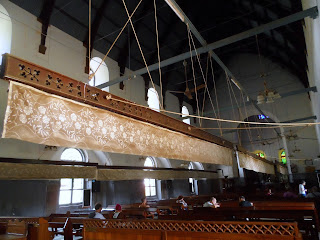Wednesday 20 February
I soon discover the downside of my little room at Mother Tree, despite its high old bed and less-hard-than-usual mattress. It is on the ground floor right next to the street, where people stand to shout into their mobiles (and can see into the room after dark). It suffers regular power cuts, and is close to a very noisy junction. But at midnight last night, quite suddenly, all goes eerily quiet. This is when the 48-hour general strike, or bandh, starts, almost as if a curfew has been imposed. So today, the streets are all but deserted. The Deccan Chronicle reports "In Kochi, tourists were seen freely moving around the streets, some expressing dismay and some helplessness."
 |
| It was hot work keeping cool. Pity the poor punka-wallah |
Back on the street, I try not to look too helpless and put on a purposeful air. Maybe this is what to expect in Kerala, which has a long tradition of political radicalism (mostly under Communist rule), a background undercurrent to the Booker Prize winning novel The God of Small Things (Arundhati Roy). Strikes are grist to the (locked-out) mill, and while much of the rest of India treats the national strike as a minor inconvenience for users of government services barely meriting front-page coverage, Kerala state is effectively closed for business.
 |
| Closed shops and deserted streets |
In the event, I spot a bike propped outside a closed shop and ask if I can hire it, and so, for Rs. 100 I get some pedal power. It's hard work (no gears) after the Goan moped, and even more wobbly thanks to a misshapen front wheel which with any loss of concentration sends me lurching off at a tangent as if caught in tramlines. It's a good job the streets are all-but deserted without buses, rickshaws or even cars. It's eerily quiet and I feel like a "survivor" in a disaster movie, emerging from my lair the day after the tornado / martian attack / nuclear holocaust. I follow the street which skirts the harbour from Fort Cochin as far as the Matancherry, or Jew Town. For 500 years this quarter was home to a major settlement of Jewish spice merchants and traders. Only a handful of families remain, as most emigrated to Israel after 1945, and the area is now dominated by Kashmiri traders in fake antiques (or it is when they are open!) Even the spice traders have mostly gone as spices are now auctioned online.
The Synagogue (1524 /1664) is closed, much to the disgruntlement of a steady stream of hapless tourists, but will open tomorrow, or so says the Jewish lady with the key. The "Dutch Palace" Museum, however is open, a bargain at Rs. 5 (6p), especially for its 18th century wall paintings of Hindu scenes. Sadly the "Ladies Chamber" downstairs is closed for restoration, so I don't get to see its famously erotic wall pictures, whose triple-X rated figures are being touched up.
 |
| Interesting photographic take on the Last Supper - almost the only "representational" art on display |
But I enjoy many things, especially the sound-and-light installation with hanging coke cans, bags or beans, etc. which make noises when touched, and a display of little boxes of 366 varieties of rice seeds with accompanying graphics about people being thrown off their land and ending up destitute. There's also a mind-numbingly pessimistic film shot by a group of Chinese activists on a Shanghai building site.
 |
| The denoument, where big bad chauvinist is about to get his come-uppance |
In the evening, to the little theatre behind the Mother Tree for their evening Kathakali show. This is the ancient formalised classical dance of Kerala, illustrating through music, mime and fantastic make-up and costumes stories from Hindu mythology. Unfortunately, but true to form, I nod off during the initial explanation. I enjoy the show, but am glad it's just the bite-sized version for tourists, not the full nine hour all-night epic.


No comments:
Post a Comment